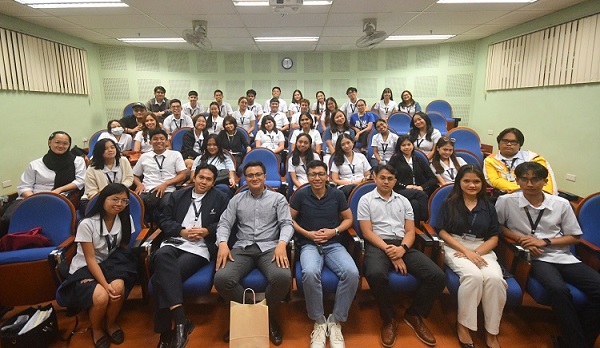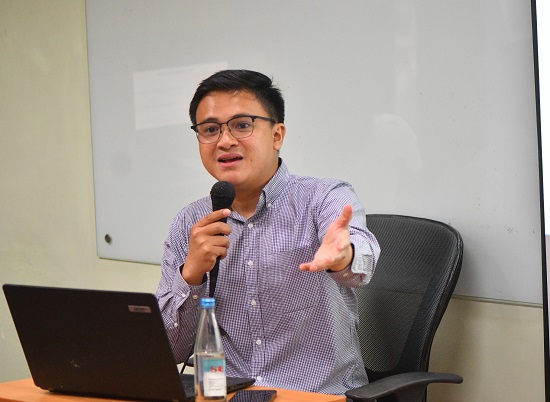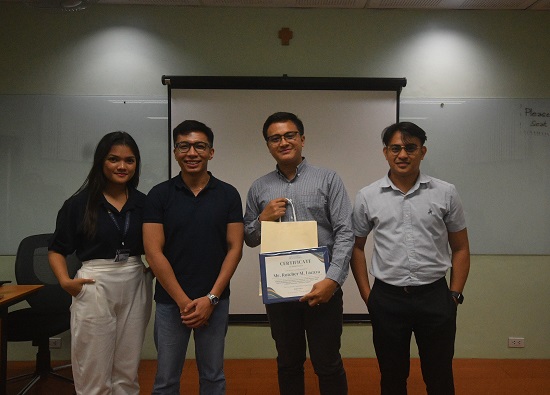By Jessica S Cahulogan and Desiree Ucab
More than a mere financial blueprint, the national budget is a reflection of a country’s priorities, challenges, and aspirations. This was the resounding message delivered by Mr Rutcher M Lacaza, a policy researcher from the Congressional Policy and Budget Research Department of the House of Representatives, during the lecture “Beyond the Numbers: National Budget FY 2025 and Its Underlying Macro-Fiscal Assumptions” held on 2 May 2025 at Xavier University – Ateneo de Cagayan, AVR 8.

Photos by: Rroj Gavenia, Rafael La Victoria, Christian Abuso
Organized by the Xavier University Economics Society and spearheaded by Mr Jhon Louie B Sabal, Chairperson of the Department of Economics, the lecture aimed to provide students and members of the academic community with a deeper understanding of the fiscal strategies embedded in the FY 2025 National Budget. Mr Lacaza’s presentation offered a rare opportunity to view the budget not just as a set of numbers but as a policy instrument that directly impacts economic growth, public services, and national development.
One of the lecture's key highlights was the breakdown of the government's macroeconomic assumptions for 2025. These include a projected real GDP growth rate of 6.0–8.0%, an inflation range of 2.0–4.0%, a foreign exchange rate between ₱56–₱58 to the US dollar, and Dubai crude oil prices set between $60–$80 per barrel. These assumptions serve as the backbone of fiscal projections, guiding revenue estimates, expenditure levels, and borrowing strategies.

Photos by: Rroj Gavenia, Rafael La Victoria, Christian Abuso
Mr Lacaza explained that the proposed ₱6.352 trillion national budget—10.1% higher than the previous year and equivalent to 22.1% of GDP—was designed with the Medium-Term Fiscal Framework (MTFF) in mind. This framework outlines key goals such as reducing the national government deficit to 3% of GDP by 2028, achieving upper-middle-income status, and lowering the national debt-to-GDP ratio to below 60% by 2025. These targets are intended to ensure macroeconomic stability while addressing urgent development needs.
The lecture also delved into the principles of sound budgeting: fiscal discipline, allocative efficiency, and operational efficiency. Mr Lacaza emphasized that while total spending is increasing, a shrinking share of allocable funds places greater pressure on Congress to ensure that limited resources are used wisely. He also highlighted the importance of sectoral allocations, noting that combined expenditures on economic and social services account for 67% of the total budget, an indicator of the government’s continued focus on development and welfare.
Another significant point discussed was the persistent budget deficit. Mr Lacaza explained that government disbursements have consistently outpaced revenues, with deficits rising from 3.4% of GDP pre-pandemic to 8.6% in 2021. While efforts are underway to close this gap through fiscal consolidation and improved tax measures, such as the recent enactment of the Ease of Paying Taxes Law and Real Property Valuation Reform, several key tax reforms remain pending.
More than a policy talk, the lecture offered an invitation for students to engage critically with public finance. Mr Lacaza encouraged future economists to see the budget as a living document—one that not only sets spending limits but also defines national priorities and values. His insights provided clarity on the often-opaque process of budget preparation and highlighted the crucial role that informed citizens and young thinkers play in promoting transparency and accountability.

Photos by: Rroj Gavenia, Rafael La Victoria, Christian Abuso
For many attendees, Beyond the Numbers was not just about understanding fiscal policy—it was about realizing its impact on everyday life and the future of the country. Through this event, the Department of Economics of Xavier Ateneo once again affirmed its commitment to producing graduates who are not only academically equipped but also socially aware and ready to lead in shaping a more equitable and sustainable Philippines.